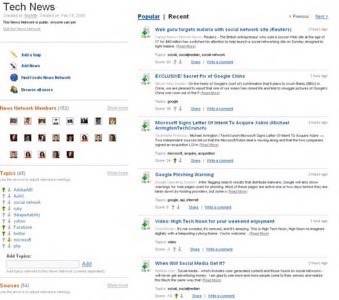Over the past couple of months, Jason Goldberg, who previously founded job search engine Jobster and vacated the CEO role last December to “pursue other early stage ventures,” has quietly relaunched his personal blog social|median and transformed it into a collaborative news filtering service. The service is still very rough around the edges and is just weeks into a private alpha test. 1000 ReadWriteWeb readers can gain access to the invite only alpha by going to the sign up page and using “RWW” (without the quotes) as the invite code.

Goldberg has created social|median along with a team of eight fellow founders working out of offices in Pune, India. Goldberg travels to India one week per month and keeps in contact with the team via Skype, Twitter, and Basecamp. “Our model at social|median is to ship fast and iterate faster based on user feedback,” he told us in an email. “As such, we shipped our first bit of ‘dogfood’ code after just 3 weeks of development just a few weeks ago and have been adding to that with nearly daily code releases ever since.”
How It Works
Social|median centers around the idea of “news networks.” Anyone can create or join a network on the site, which acts as a sponge, soaking up news that matches predefined topics from specified sources and delivering them back out to the network members. Once a network is created, users begin to add topics and sources it wants the network to watch out for. Social|median searches the web for news sites and blogs it things match the topics defined by users and suggests them as source additions. Network members have complete control over which sources social|median keeps tabs on and which topics it should match stories to, and can vote sources and topics up or down to help train the algorithm to suit the network’s tastes.
Because anyone can create a network, they can literally be about anything, from very broad topics like “politics” to very specific ones, such as “lymphoma research.”

In addition to auto-fed stories, users have the option of submitting stories to the site via a bookmarklet. The site automatically parses the stories to the users’ correct networks based on topic keywords it finds in the story. Goldberg noted that “relevant news submitted by users” is generally a top rated source in most news networks on the site.
Social|median has two ways of displaying news: recent — which is based on time, relevance, and source weighting, and popular — which takes into account user interaction, such as commenting, voting, and emailing of stories. We noticed that often stories would stay popular for days at a time, but Goldberg tells us that is a function of not enough people using the site (just over 1000 at press time), rather than necessarily a faulty algorithm.
Conclusion
“My inspiration for this service came when I was on the treadmill at the gym one day and observing that all 50 people there were watching the same 30 minutes package of CNN Headline News,” Goldberg told us, “while all 50 of us have very different interests — it hit me that at some point in the future we should be able to get more of just the news relevant to our unique interests — so I started to think about how we might step our way towards that.”
Information overload is something we’ve written a lot about on this blog. Social|median’s collaborative filtering approach to cutting through the noise is an old one (see: Digg, del.icio.us, etc.) but the concept of news networks and stories fed automatically based on topical relevance (as determined by a machine) is an interesting twist. Clearly, social|median is an alpha service — it has many rough edges — but Goldberg and company are iterating quickly and we’re keen to see what they come up with in the next few months. This is one to keep an eye on.
1000 ReadWriteWeb readers can gain access to the invite only alpha by going to the sign up page and using “RWW” (without the quotes) as the invite code. Invites are on a first come, first serve basis.









